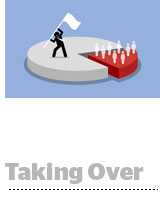 Here’s today’s AdExchanger.com news round-up… Want it by email? Sign up here.
Here’s today’s AdExchanger.com news round-up… Want it by email? Sign up here.
TAM Jam
Programmatic advertising will make up 83% of US display dollars by 2019, according to an updated programmatic spend forecast from eMarketer. By 2019, more than $45.7 billion will be transacted programmatically. Almost 80% of that spend will flow through private marketplaces and programmatic guaranteed deals as the industry continues to vie with fraud, viewability and transparency issues. For the first time ever, the percentage of programmatic media spent on open exchanges will dip into single digits, but the buying method will be sustained by the continued adoption of header bidding. By 2019, about 80% of programmatic dollars will be spent on mobile and 77% of all US digital video dollars will be transacted programmatically. More.
Ads.txt.ftw
After three months, only 13% of the 10,000 top domains with digital advertising had adopted the IAB’s Ads.txt file, which could prevent some of the most flagrant online ad fraud if widely adopted by publishers. “Even one or two months ago, it was slow going,” IAB senior VP Dennis Buchheim tells Digiday. But since Google announced this month that DoubleClick Bid Manager and then AdSense and DoubleClick Ad Exchange will filter for the Ads.txt tag, the adoption rate has surged to almost half. Michael Stoeckel, VP at the Prohaska Consulting Group, says Google should get most of the credit for driving Ads.txt because until it started filtering inventory, “many publishers, though not all, were just playing a waiting game.” More.
RTweets
Twitter offered Russian median network RT 15% of US 2016 election ads for $3 million, reports Alex Kantrowitz at BuzzFeed. Before the emailed pitch, RT had only a 2% share of voice on US political advertising. Of course, since Russia’s meddling became public, Twitter has kept RT-owned profiles from advertising at all on the social media platform. Twitter declined to comment about “private conversations with any advertiser, even a former advertiser,” but Kantrowitz noted that Twitter “did not dispute the email’s validity.” Also of note, CNN had 56% share of voice on US 2016 election advertising, and Fox had 32%. Read more.
Trust Busting
Google and Facebook captured 99 cents out of every new dollar spent on online advertising this past year, but “neither company has ever faced serious antitrust scrutiny in the U.S.,” writes Yelp public policy VP Luther Lowe in The Wall Street Journal. Congress is likely to set regulatory standards requiring that online political ads disclose the buyer, but Lowe hopes legislators take a broader perspective and deconsolidate the two platforms on the grounds that “the consumer internet has become too concentrated in a few dominant companies, creating easy targets for bad actors.” He would prefer to see Facebook’s social and messaging properties split apart, and Google’s algorithm give equal consideration to independent services and “house products.” More.
But Wait, There’s More!
This post was syndicated from Ad Exchanger.

More Stories
Everyone must go Tourism NZ campaign is no 100% Pure… But this might just work
Waka Kotahi tackles drug driving with FCB and MBM
Unbound joins HubSpot for elite client data